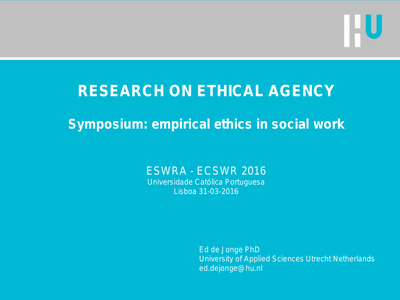Vergelijkende Europese studie in opdracht van Kees van Aken, toenmalig directeur van de opleiding Social Work i.o. van de Hogeschool Zuyd, naar welke verschillende varianten er mogelijk zijn als er gesproken wordt over een Internationale Bachelor Social Work - Maastricht. Op welke manieren zijn er in Europa reeds internationale bachelors zijn ontwikkeld. Het onderzoek moet een overzicht van enkele blauwdrukken van een Internationale Bachelor Social Work opleveren, om mede op basis daarvan een keuze te maken voor een (eventueel meerdere) voor Hogeschool Zuyd wenselijke variant(en) daarvan in Maastricht. Er is vergelijkend Europees onderzoek gedaan naar de verschillende filosofieën en organisatievormen van curricula International Social Work zoals die op verschillende Hogescholen en Universiteiten in Europa functioneren. Met name zijn “good practice” ervaringen onderzocht en met elkaar vergeleken, om op basis daarvan een aantal varianten helder te krijgen voor de opdrachtgever.
DOCUMENT

Social work is a profession that is very much part of and contributes to an ever changing and evolving society. It is therefore essential that social work is able to respond to the diverse and dynamic demands that it may encounter in that society and in the future. The critique of social work is, however, present and growing. The profession can no longer deny or ignore the need to legitimize its value and effectiveness. In this article, a research project – entitled Procivi – aimed at developing a method of legitimizing social work is presented. The method developed in Procivi proposes a way of legitimizing social work through the development of reflective professionals. The method teaches professionals to take a research frame of mind towards their own practice and helps them develop a vocabulary to describe their work to different audiences. The paper discusses whether and how this method forms a viable way of legitimizing social work and as such could be an alternative for the growing demand for social work based on scientific evidence (evidencebased practice, EBP).
MULTIFILE

Column over de vraag: wil het Nederlandse “sociaal werk” nog wel een internationaal perspectief? Onder de titel "Social work in een international perspectief" is deze column uitgesproken tijdens het symposium “Samenleven is geen privézaak” op 29 maart 2012, ter gelegenheid van het afscheid Hans van Ewijk (lector sociale innovatie).
MULTIFILE

Symposium ESWRA - ECSWR 2016: empirical ethics in social work. Objective: ethical aspects of social work (esp. at home) Structure: cooperation of the research group of UAS Utrecht Netherlands with six regional welfare organizations Method: practice based ethics research Focus on professional practice: learning from moral experiences in frontline practice (cf. Van Doorn, 2008) Hybrid approach: combining theoretical resources and professional practice (cf. Banks & Gallagher, 2009) Mixed methods: desk research, interviews, best practice units (BPU), development of ethical tools
DOCUMENT

Een bezinning op de identiteit en de positie van het Instituut voor Social Work van Hogeschool Utrecht.
DOCUMENT

This research aims to contribute to a better understanding of strategic collaborations between work-integration social enterprises (WISEs) and for-profit enterprises (FPEs) with the joint objective to improve labour market opportunities for vulnerable groups. We find that most collaborations strive towards integration or transformation in order to make more social impact.
LINK
Because social workers respond to local contexts, it is often said that social work is not a global profession. Indeed, social workers adapt their practices to local conditions. However, these local practices are recognised globally. The exchange of these practices and methods enriches social workers, inspires them and strengthens the further development of the profession. To facilitate this exchange, social work has had several international associations and networks for almost a century, which have enabled the sharing of local practices and educational programs. Today, social work works within a basic international framework that guides both professional practice and education. This descriptive article will take the reader through the history of international social work, by mentioning some global social work associations and networks and their achievements. Furthermore, the article will address internationalisation of the social work curriculum and will mention the added values and disadvantages of an international experience abroad. (Includes an abstract in the Slovakian language)
MULTIFILE
Presentation at the 6th International Conference on Sociology and Social Work – Zwolle, The Netherlands, 24 and 25th August 2016
DOCUMENT